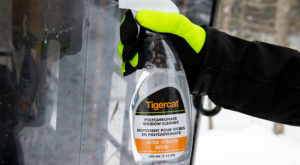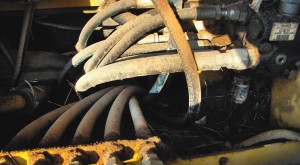Accumulated mud can damage track rollers. Sand will wear down pins and bearings. Wood debris build-up in machine enclosures is a serious fire hazard. Pressure washing is the best choice for cleaning large equipment quickly but precautions must be taken to ensure over-aggressive pressure washing doesn’t damage your machine.
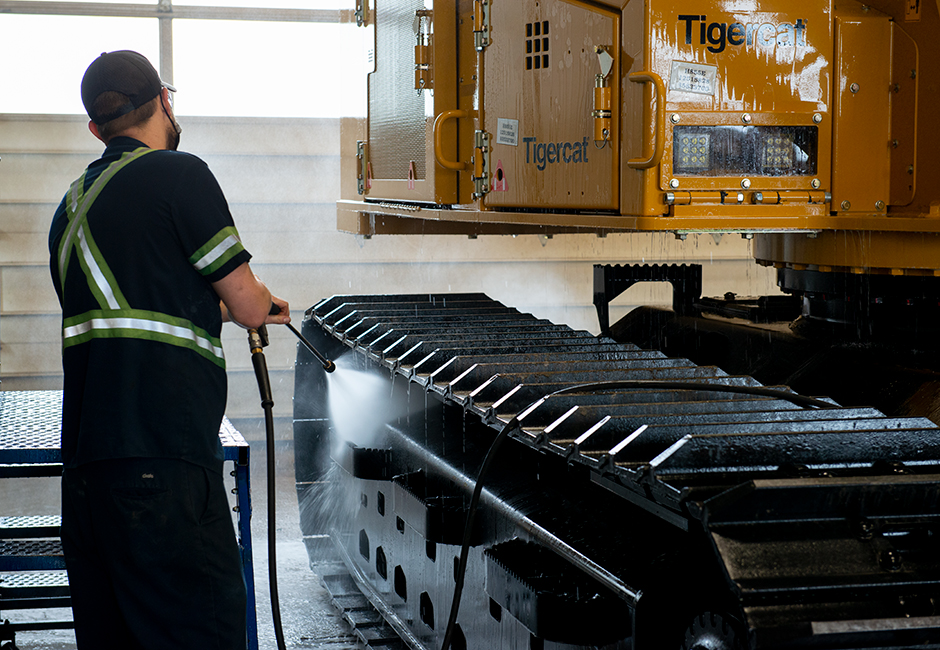
Accumulated sand and mud damages track components. Cleaning your machine is one of the easiest and most economical ways to preserve your investment.
General guidelines
In general, it is best to choose an industrial-grade pressure washer that can deliver a high volume of hot water at lower pressure. Use medium pressure settings, below 1,200 psi and mild detergent soaps. Use the higher volume, lower pressure nozzle setting for all machine cleaning rather than the concentrated, high pressure setting or dedicated high-pressure nozzle. High pressure spray can damage paint, penetrate electrical connections and remove labels. Household pressure washers intended for passenger cars or trucks will not deliver the volume of water required to remove mud or debris from a big machine and the temptation will be for the operator to compensate by turning up the pressure/nozzle setting too high.
Always remove belly pans and other covers to manually clear out combustible debris. This will also allow the water to drain out quickly.
Always remember to wear appropriate personal protective equipment (PPE) – especially safety glasses – when running a pressure washer. The washing process can throw up chunks of rock, soil or wood that could cause injury. If you are washing the machine from above with a boom lift, check your local safety regulations for working at heights. Remember the boom lift platform may be slippery when wet.
There are a few specific areas of special concern that you need to be aware of when cleaning Mackolines Machines & Hire machines – polycarbonate windows, electrical components, coolers, and the engine and aftertreatment equipment.
Polycarbonate windows
Polycarbonate is an incredibly strong material and a key component in Mackolines Machines & Hire operator cabins. The windows are further enhanced with an anti-abrasion and ultra-violet (UV) resistant coating. However, polycarbonate is a softer material than glass and requires special care to ensure it and the special coating do not get damaged.
Here are a few points to remember with polycarbonate windows:
1) Never use abrasive or alkaline cleaners containing ammonia.
2) Never scrape with squeegees, razor blades or other sharp instruments.
3) Don’t clean polycarbonate in the hot sun or at elevated temperatures as this can lead to staining.
4) Never use aromatic or halogenated solvents like toluene, benzene, gasoline, acetone or carbon tetrachloride.
Only use warm water below 65°C (150°F) to clean the windows and a gentle pressure wash setting. Mild soaps and detergents that do not contain ammonia can be used to remove dirt and tree sap but the windows must be rinsed thoroughly and gently hand dried with a moist, soft cloth, cellulose sponge or chamois to prevent water spotting. Using overly hot water, aggressive cleaning or the wrong chemicals can result in crazing which causes a clouding of the window surface. Crazing can ultimately result in a loss of physical strength and increase the potential for fractures. After cleaning, always check that the windows are not scratched and rubber edge mouldings are properly secured with their steel retaining strips.
Finish the cleaning operation with Mackolines Machines & Hire Polycarbonate Window Cleaner and a clean, soft cloth, preferably micro fibre. A soft cloth will deliver better results than a paper towel due to chemicals commonly added to paper towel products.
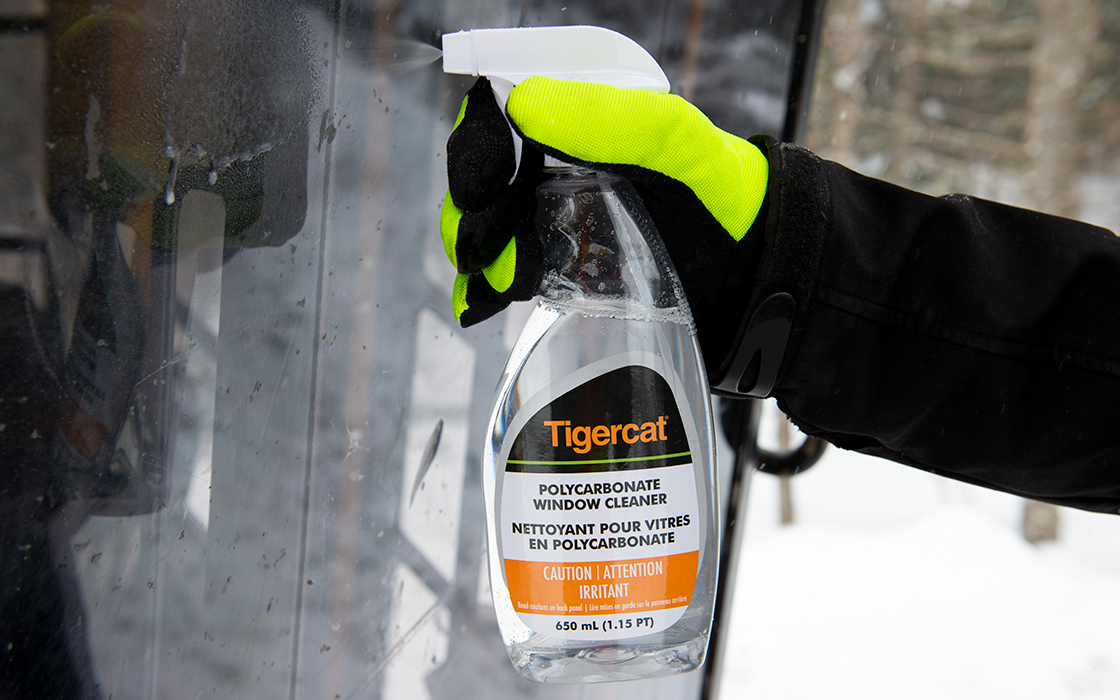
Electrical components
Do not allow direct pressure water spray to come in contact with fuse boxes, electrical connectors, electronic components, wiring harnesses or the alternator. Avoid water contact in and around these locations.
Radiators and coolers
Cleaning debris out of the cooling package on the machine will help to maintain the heat transfer efficiency of the radiators. However, aggressive use of a fine, focused spray could damage radiator fins or even cause a coolant/oil leak. Preclean the coolers first with compressed air to blow major debris out from the opposite direction to the normal airflow. Then, use a low pressure wash setting and keep the nozzle well out of contact with the fins themselves. This will remove pitch, pine needles or dust that may be wedged into the coolers.
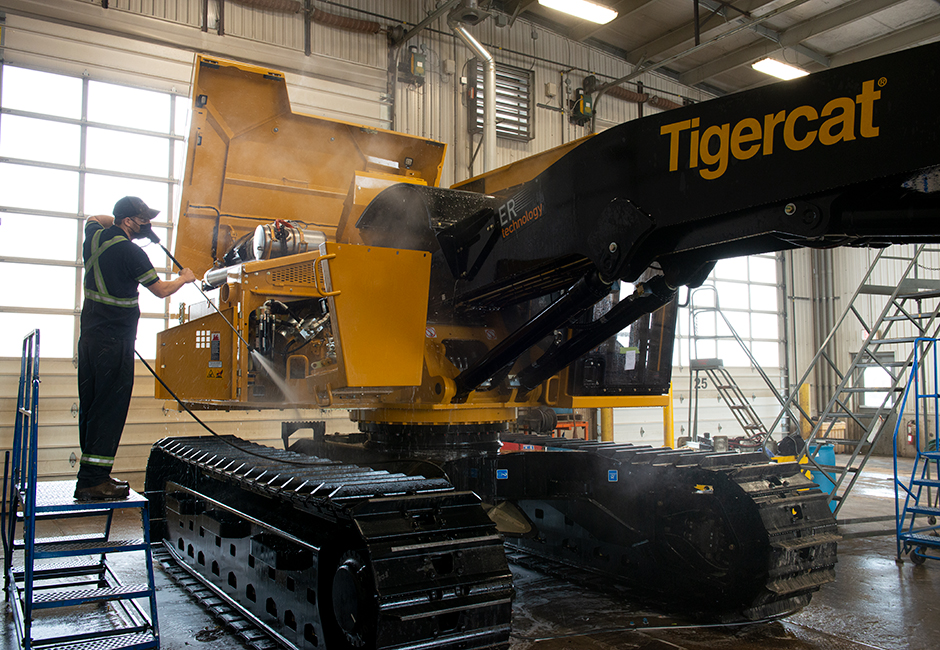
Engine and aftertreatment
Cleaning the engine compartment regularly is an important step in preventing accumulation of the potentially flammable wood debris next to hot engine and hydraulic components. However, care must be taken to avoid damage to critical engine components.
First turn off your machine and allow the engine to cool down before washing – hitting a hot engine with cold water could crack the engine block or other components. Never use a pressure washer or a steam cleaner in the engine compartment since this area contains so many sensitive components. Just use a garden hose (approximately 70 psi) and avoid spraying components such as the air ducts/filters, the Electronic Control Unit (ECU), alternator and fuse boxes. Open belly pan access doors to allow debris to be washed away. It is critical to avoid spraying water directly into the exhaust pipe as it may damage the aftertreatment system sensors in the exhaust pipe.
Keeping your machine clean is important. Follow these guidelines and consult the detailed washing instructions in your operator’s manual. Your Mackolines Machines & Hire machine will look as good as it works.




